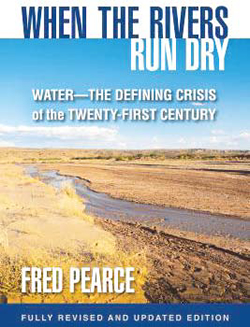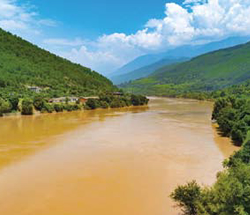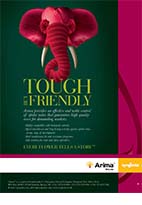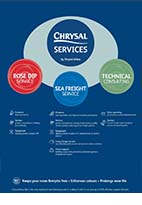 Water - The Defining Crisis of the TwentyFirst Century’
Water - The Defining Crisis of the TwentyFirst Century’
“Oil we can replace. Water we can’t - which is why this book is both so ominous and so important.” (Bill McKibben, author of The End of Nature)
Throughout history, rivers have been our foremost source of fresh water both for agriculture and for individual consumption, but now economists say that by 2025 water scarcity will cut global food production by more than the current U.S. grain harvest.
In this ground-breaking book, veteran science correspondent Fred Pearce focuses on the dire state of the world’s rivers to provide our most complete portrait yet of the growing world water crisis and its ramifications for us all.
Pearce traveled to more than 30 countries examining the current state of crucial water sources like the Indus River in Pakistan, the Colorado River in the U.S., and the Yellow and Yangtze rivers in China. Pearce deftly weaves together the complicated scientific, economic, and historic dimensions of the water crisis, showing us its complex origins - from waste to wrong-headed engineering projects to high-yield crop varieties that have saved developing countries from starvation but are now emptying their water reserves.
He reveals the most daunting water issues we face today, among them the threat of flooding in China’s Yellow River, where rising silt levels will prevent dikes from containing floodwaters; the impoverishment of Pakistan’s Sindh, a once-fertile farming valley now destroyed by the 15 million tons of salt that the much-depleted Indus deposits annually on the land but cannot remove; the disappearing Colorado River, whose reservoirs were once the lifeblood of seven states but which could easily dry as overuse continues; and the poisoned springs of Palestine and the Jordan River, where Israeli control of the water supply has only fed conflict between Israelis and Palestinians.
The situation is dire, but not without remedy. Pearce argues that the solution to the growing worldwide water shortage is not more and bigger dams, but a greater efficiency and a new water ethic based on managing the water cycle for maximum social benefit rather than narrow self-interest.
Water: A Global Crisis
Among the barrage of environmental problems we face today, from climate change, to deforestation, to pollution, there is another potential disaster looming on the horizon that journalist Fred Pearce argues is not getting enough attention--major rivers across the globe are no longer flowing all the way to their traditional outfalls.
 This is leading to a shortage of clean, potable water for many communities and damaging riparian habitats and wetlands. In his book When the Rivers Run Dry: Water--the Defining Crisis of the Twenty-First Century, Pearce takes his readers on a global journey, explaining the impact of increasing water scarcity. He explores how this dire problem came about, and posits some possible solutions.
This is leading to a shortage of clean, potable water for many communities and damaging riparian habitats and wetlands. In his book When the Rivers Run Dry: Water--the Defining Crisis of the Twenty-First Century, Pearce takes his readers on a global journey, explaining the impact of increasing water scarcity. He explores how this dire problem came about, and posits some possible solutions.
Pearce places agriculture at the centre of the problem. Most of the water we currently use goes towards growing and processing food. Many green revolution crops are particularly water-intensive, and water is quickly becoming the factor limiting global agricultural output. Transporting “virtual water” in the form of food and crops also acts as a drain on an area’s hydrological resources.
Pearce is especially concerned with the use of groundwater to fill the water gap drying rivers leave. While over-pumping underground aquifers is an interim stop-gap measure, it is not a viable lasting solution. He sees large dams as another technological expedient that offers short-term benefits while creating longterm problems, such as habitat destruction, population displacement, blocking the movement of silt, and flooding.
In the end, Pearce calls for the standard battery of solutions. For agriculture, which he posits as the most substantial quarter for water savings, he proposes farmers aim for “more crop per drop,” which can be achieved through drip irrigation, more water-efficient crops, and growing crops appropriate to the particular area’s climate. He calls for less subsidization of water prices as a way to make farmers think before they open the sluice gates. He also supports domestic conservation and better-maintained water conveyance systems. Overall, Pearce urges us to better manage the water cycle--to turn away from a dependence on diminishing groundwater resources and instead look towards rainwater harvesting. He asks us to work with nature and implement the strategies offering the greatest social benefit not to primarily look after the self-interests of those who can afford to build dams or import water. The planet needs a “blue revolution” before the consequences are irreversible.
Pearce could have expanded his analysis of the impacts of climate change on the water cycle, an increasingly important question as we alter the environment around us. Potentially, global warming could cause changes in rainfall patterns, sparking massive drought in some areas and flooding in others, further impacting communities and ecosystems that are already distressed. Climate change could also cause snow-packs to melt earlier, freeing water in a surge instead of a more modulated release, directly affecting river flows.
While Pearce does allude to the importance of groundwater recharge, more emphasis on this potential solution would be better in his conclusion. Placing water back into aquifers is one of the most environmentally friendly forms of water storage--it does not inundate large tracts of land, and once the water is captured it does not evaporate as it would in an above-ground reservoir. A last point for Pearce to develop is what countries are doing on an international level to regulate the use of water. Many of the rivers Pearce discusses cross national boundaries, making cooperative international political action just as important as local drives to conserve, especially as climate change makes water flows ever more unpredictable. Are there any nations that have successfully cooperated to share this vital resource in an equitable way? And what can others take from these agreements?
As major rivers worldwide dry up, economies as well as ecosystems are impacted. Addressing wasteful agricultural use is a start, but we cannot ignore urban areas as we face our global water problem. Though the bulk of our water, 70-80 percent in most estimates, does go for agricultural use, every conserved drop counts. Our current water use patterns are obviously not sustainable, and it is time to chart a new course before the negative effects become even more disastrous.
Economists created the term “virtual water” to refer to the water used to grow crops or manufacture products destined for export. For instance, if it takes 130 gallons of water to grow a pound of wheat, and that wheat is sold abroad, then that 130 gallons of water is being exported as well.
The growing water crisis represents the greatest ecological and human rights crisis of our time. Fred Pearce has helped sound the alarm with this passionate, knowledgeable, and thoroughly researched book. A veteran reporter, Pearce cuts to the heart of the crisis and tells the human stories behind what can be soul-numbing facts. A great contribution.


